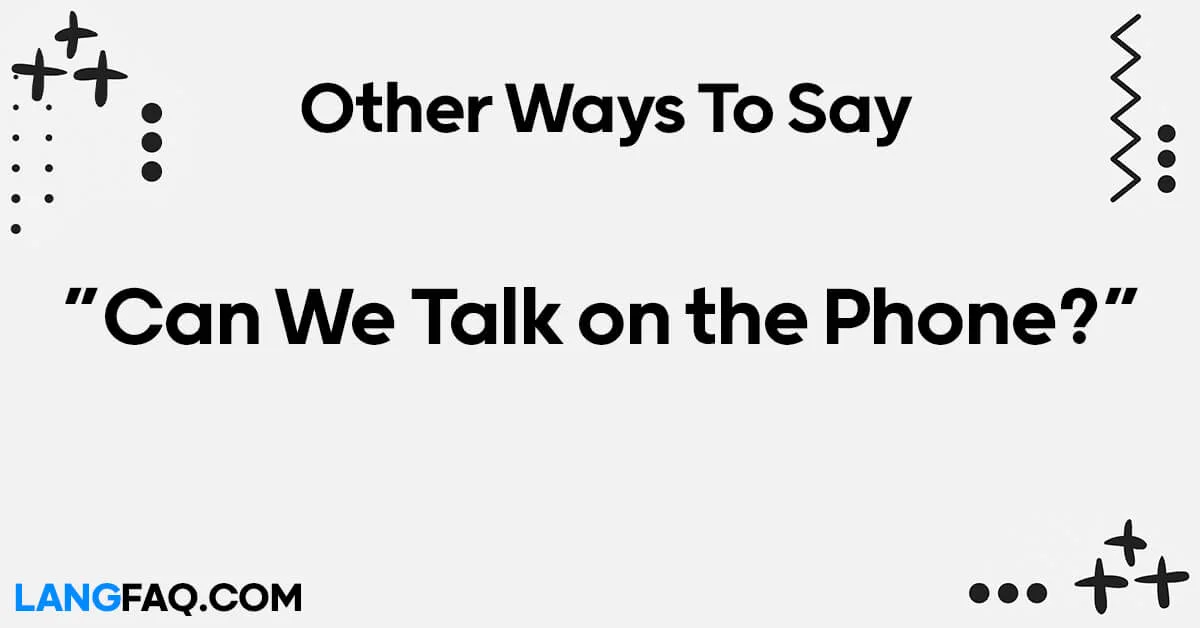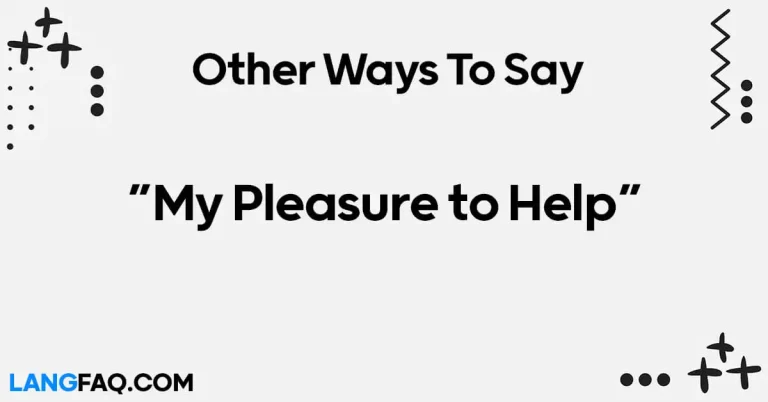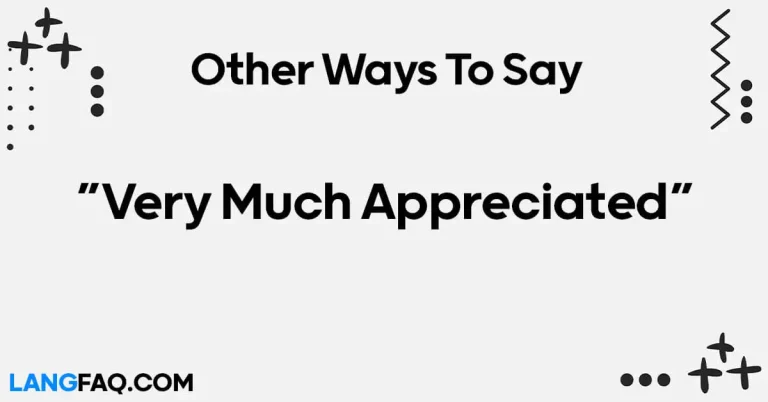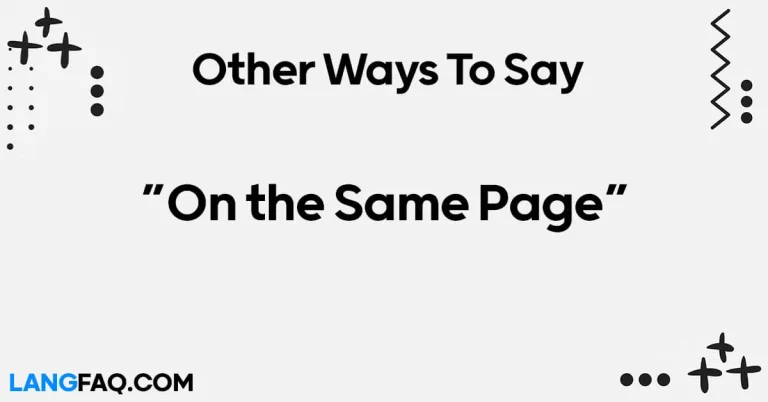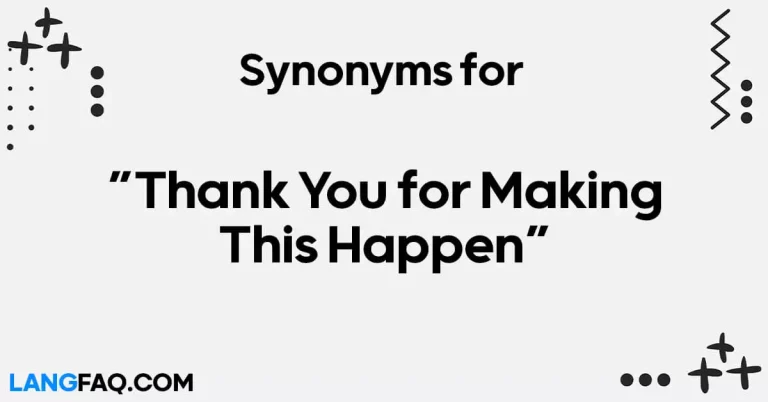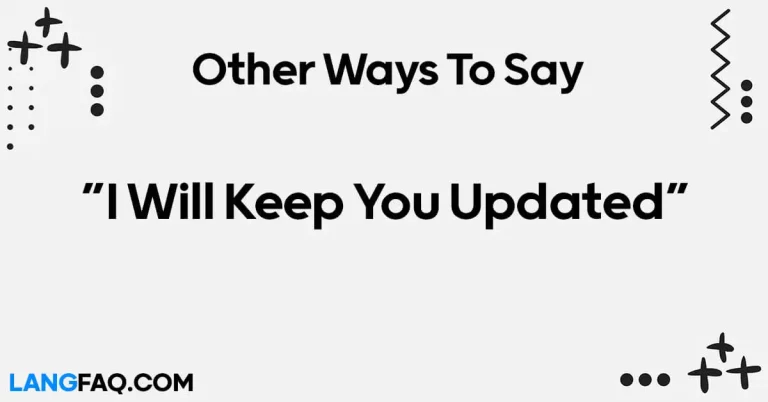In a world dominated by digital communication, the art of initiating a phone conversation might seem like a lost skill. However, there are numerous creative and effective ways to prompt a discussion over the phone beyond the conventional phrase “Can we talk on the phone?” Here, we delve into 12 alternative approaches that are bound to make your phone conversations more engaging and fruitful.
12 Other Ways to Ask “Can We Talk on the Phone?”
Here are 12 other ways to ask “Can we talk on the phone?”:
- “Would you be available for a phone call?”
- “Could we chat over the phone?”
- “Is now a good time to have a conversation over the phone?”
- “Are you free to talk on the phone for a few minutes?”
- “Could we connect via phone?”
- “Would you prefer to discuss this over a call?”
- “Can we have a quick call to discuss?”
- “Is it convenient for you to speak on the phone?”
- “Do you have a moment to chat over the phone?”
- “Shall we hop on a call to go over this?”
- “Would you mind if I gave you a ring?”
- “Could we schedule a phone call to go over the details?”
| Phrase | Meaning | Example |
|---|---|---|
| “Would you be available for a phone call?” | Asking if the person is free to talk on the phone. | “Would you be available for a phone call later today?” |
| “Could we chat over the phone?” | Suggesting a conversation over the phone. | “Could we chat over the phone about the project?” |
| “Is now a good time to have a conversation over the phone?” | Inquiring about the suitability of the current time for a phone discussion. | “Is now a good time to have a conversation over the phone?” |
| “Are you free to talk on the phone for a few minutes?” | Asking if the person has a few minutes to spare for a phone call. | “Are you free to talk on the phone for a few minutes now?” |
| “Could we connect via phone?” | Proposing to communicate through a phone call. | “Could we connect via phone to discuss the details?” |
| “Would you prefer to discuss this over a call?” | Asking if the person prefers discussing the matter over a phone call. | “Would you prefer to discuss this over a call or via email?” |
| “Can we have a quick call to discuss?” | Proposing a brief phone conversation to discuss something. | “Can we have a quick call to discuss the agenda?” |
| “Is it convenient for you to speak on the phone?” | Asking if it’s convenient for the person to speak on the phone. | “Is it convenient for you to speak on the phone now?” |
| “Do you have a moment to chat over the phone?” | Asking if the person has a moment to chat over the phone. | “Do you have a moment to chat over the phone about the project?” |
| “Shall we hop on a call to go over this?” | Proposing to have a phone call to discuss something. | “Shall we hop on a call to go over this week’s schedule?” |
| “Would you mind if I gave you a ring?” | Asking if it’s okay to call the person. | “Would you mind if I gave you a ring to discuss the plan?” |
| “Could we schedule a phone call to go over the details?” | Proposing to schedule a phone call for discussing details. | “Could we schedule a phone call to go over the project details?” |
These alternative phrases offer diverse ways to initiate a phone conversation politely and effectively, catering to various situations and preferences. Whether it’s scheduling a call, checking availability, or proposing a quick discussion, these phrases provide flexibility and courtesy in communication.
Is It Correct to Say “Can We Talk on the Phone?”?
Yes, it is correct to say “Can we talk on the phone?” This phrase is a polite and straightforward way to inquire about the possibility of having a conversation over the phone. It is commonly used in both formal and informal contexts to initiate communication with someone remotely. The use of “can” indicates the ability or possibility of having a phone conversation, while “we” implies mutual participation in the conversation. Overall, “Can we talk on the phone?” is a grammatically correct and widely accepted phrase for initiating phone communication.
Professional Mail Example With “Can We Talk on the Phone?”
Subject: Discussion Opportunity: Can We Talk on the Phone?
Dear [Recipient’s Name],
I trust this email finds you well. I am reaching out to discuss [briefly mention the topic or reason for the conversation]. Given the importance and complexity of the matter, I believe it would be beneficial for us to have a conversation to explore it further.
Could we schedule a phone call at your earliest convenience to discuss this in more detail? I believe a verbal discussion will allow us to address any questions or concerns more effectively and expedite the decision-making process.
Please let me know your availability, and I will ensure to accommodate your schedule accordingly. Alternatively, feel free to suggest a time that works best for you.
I look forward to the opportunity to connect and discuss [briefly mention the topic or reason for the conversation]. Thank you for your time and consideration.
Best regards, [Your Name]
“Would you be available for a phone call?”
Asking someone if they’re available for a phone call is a polite and direct way to initiate a conversation over the phone. This phrase is suitable for both formal and informal contexts, demonstrating respect for the other person’s time and schedule.
When to Use:
- Formal Context: Use this phrase when reaching out to colleagues, clients, or professionals in a formal setting.
- Informal Context: It can also be used when contacting friends or family members in a respectful manner.
Example:
Dialogue between colleagues: Person A: “Hi [Colleague’s Name], would you be available for a phone call later today to discuss the project updates?” Person B: “Certainly, I’m available at 3 PM. Does that work for you?”
Variations:
- “Are you free for a quick call?”
- “Do you have a moment to chat over the phone?”
- “Could we schedule a phone call to go over the details?”
Dictionary Insight:
According to the Cambridge Dictionary, “available” means “able to be bought or used; free to see or use.” This phrase conveys the idea of checking if the other person has the time or willingness to engage in a phone conversation.
Pros and Cons:
- Pros: Direct and respectful, suitable for various contexts.
- Cons: May sound slightly formal, may not be ideal for very casual conversations.
Usage Tips:
- Use this phrase when you need to discuss something that requires immediate attention or a detailed conversation.
- Avoid using it repeatedly with the same person to avoid sounding overly formal or persistent.
Email Sample:
Subject: Quick Call to Discuss Project Updates Hi [Colleague’s Name],
I hope this email finds you well. Would you be available for a phone call later today to discuss the project updates? I have a few ideas I’d like to run by you.
Looking forward to our conversation.
Best regards, [Your Name]
“Could we chat over the phone?”
Proposing to chat over the phone offers a casual and friendly way to initiate a conversation. This phrase is suitable for both formal and informal contexts, making it versatile for various relationships and situations.
When to Use:
- Formal Context: Use this phrase when contacting colleagues or clients in a professional setting.
- Informal Context: It’s also suitable for reaching out to friends or acquaintances in a relaxed manner.
Example:
Dialogue between friends: Person A: “Hey [Friend’s Name], could we chat over the phone later? I have some exciting news to share!” Person B: “Of course! I’m looking forward to catching up.”
Variations:
- “Shall we hop on a call to go over this?”
- “Mind if I give you a call to discuss?”
- “Let’s have a quick chat over the phone.”
Dictionary Insight:
According to the Cambridge Dictionary, “chat” means “to talk in a friendly, informal way, especially about things that are not important.”
Pros and Cons:
- Pros: Friendly and approachable, suitable for various relationships.
- Cons: May not convey urgency or seriousness for important matters.
Usage Tips:
- Use this phrase when you want to engage in a casual conversation or catch up with someone.
- Avoid using it for discussions that require a formal tone or urgent attention.
Email Sample:
Subject: Catching Up Over the Phone Hi [Friend’s Name],
I hope you’re doing well! I was thinking it would be great to catch up over the phone sometime this week. Are you available for a chat?
Looking forward to hearing from you!
Best, [Your Name]
“Is now a good time to have a conversation over the phone?”
Asking if the current moment is suitable for a phone conversation shows consideration for the other person’s availability and ensures that the timing is convenient for both parties. This phrase is particularly useful in professional settings where schedules may be tight.
When to Use:
- Formal Context: Use this phrase when contacting colleagues, clients, or business associates to ensure that the timing aligns with their schedule.
- Informal Context: It can also be used when reaching out to friends or family members to respect their time.
Example:
Dialogue between colleagues: Person A: “Hi [Colleague’s Name], is now a good time to have a conversation over the phone about the upcoming project deadline?” Person B: “Actually, I’m in the middle of a meeting right now. Can we talk in about an hour?”
Variations:
- “Would it be convenient to talk on the phone now?”
- “Are you available for a quick call at the moment?”
- “Do you have a few minutes for a phone conversation?”
Dictionary Insight:
According to the Cambridge Dictionary, “good time” refers to “a suitable or convenient time for doing something.”
Pros and Cons:
- Pros: Shows consideration for the other person’s schedule, ensures that the conversation occurs at an appropriate time.
- Cons: May lead to rescheduling if the timing is not suitable for one or both parties.
Usage Tips:
- Use this phrase when you need to have a discussion but want to ensure that the other person is available to talk.
- Be prepared to suggest alternative times if the current moment is not convenient for the other person.
Email Sample:
Subject: Quick Phone Call About Project Deadline Hi [Colleague’s Name],
I hope you’re having a productive day! I wanted to discuss the upcoming project deadline with you. Is now a good time to have a conversation over the phone, or would you prefer to schedule it for later?
Looking forward to your response.
Best regards, [Your Name]
“Are you free to talk on the phone for a few minutes?”
Asking if someone is free for a brief phone conversation is a considerate way to gauge their availability without imposing on their time. This phrase is ideal for situations where you need to discuss something quickly or provide a brief update.
When to Use:
- Formal Context: Use this phrase when contacting colleagues or clients for a short discussion that doesn’t require extensive time.
- Informal Context: It’s suitable for reaching out to friends or family members for a quick catch-up or to share brief information.
Example:
Dialogue between friends: Person A: “Hey [Friend’s Name], are you free to talk on the phone for a few minutes? I have some exciting news to share!” Person B: “Sure thing! Let me grab my phone.”
Variations:
- “Do you have a moment to chat over the phone?”
- “Could we have a quick call to go over this?”
- “Mind if I give you a ring for a brief conversation?”
Dictionary Insight:
According to the Cambridge Dictionary, “free” means “not busy; not occupied with something else.”
Pros and Cons:
- Pros: Respectful of the other person’s time, allows for quick communication.
- Cons: May lead to longer conversations if not managed properly.
Usage Tips:
- Use this phrase when you need to discuss something briefly or provide a quick update.
- Be mindful of the other person’s time and keep the conversation concise and to the point.
Email Sample:
Subject: Quick Phone Call for Project Update Hi [Colleague’s Name],
I hope you’re doing well! I have a quick project update to discuss with you. Are you free to talk on the phone for a few minutes today?
Looking forward to catching up.
Best regards, [Your Name]
“Could we connect via phone?”
Proposing to connect via phone offers a straightforward and professional way to initiate a conversation. This phrase is suitable for formal contexts, such as professional settings or when contacting clients or business associates.
When to Use:
- Formal Context: Use this phrase when reaching out to colleagues, clients, or professionals in a professional setting.
- Business Context: It’s suitable for initiating discussions related to business matters or professional collaborations.
Example:
Dialogue between business associates: Person A: “Hello [Client’s Name], could we connect via phone to discuss the latest project updates?” Person B: “Certainly, I’m available for a call tomorrow afternoon. Will that work for you?”
Variations:
- “Shall we have a phone conversation to go over this?”
- “Would it be convenient to connect via phone to discuss?”
- “Could we schedule a phone call to address this matter?”
Dictionary Insight:
According to the Cambridge Dictionary, “connect” means “to join or be joined with something physically, or to be joined or related in some way.”
Pros and Cons:
- Pros: Professional and direct, suitable for business communications.
- Cons: May sound slightly formal for casual conversations.
Usage Tips:
- Use this phrase when you need to discuss business matters or professional topics that require a formal tone.
- Be clear about the purpose of the phone call and any specific topics you wish to address.
Email Sample:
Subject: Phone Discussion About Project Updates Dear [Client’s Name],
I hope this email finds you well. I would like to connect via phone to discuss the latest project updates and address any questions or concerns you may have. Could we schedule a phone call at your earliest convenience?
Looking forward to our conversation.
Best regards, [Your Name]
“Would you prefer to discuss this over a call?”
Asking if the other person prefers to discuss the matter over a call offers flexibility and ensures that their preferred mode of communication is taken into consideration. This phrase is suitable for both formal and informal contexts, demonstrating attentiveness to the other person’s preferences.
When to Use:
- Formal Context: Use this phrase when contacting colleagues, clients, or business associates to ensure that their preferred mode of communication is respected.
- Informal Context: It can also be used when reaching out to friends or family members to accommodate their communication preferences.
Example:
Dialogue between colleagues: Person A: “Hi [Colleague’s Name], would you prefer to discuss this over a call, or would you rather communicate via email?” Person B: “I think a call would be more efficient. Let’s schedule one for later today.”
Variations:
- “Do you prefer to have a phone conversation about this?”
- “Would you like to talk on the phone to discuss?”
- “Is a phone call the best way to address this?”
Dictionary Insight:
According to the Cambridge Dictionary, “prefer” means “to like, choose, or want one thing rather than another.”
Pros and Cons:
- Pros: Shows consideration for the other person’s preferences, allows for tailored communication.
- Cons: May require scheduling and coordination for phone calls.
Usage Tips:
- Use this phrase when you want to ensure that the other person’s preferred mode of communication is accommodated.
- Be prepared to schedule a phone call if the other person prefers to discuss the matter over the phone.
Email Sample:
Subject: Discussion Preference: Phone or Email? Hi [Colleague’s Name],
I hope you’re doing well. I wanted to discuss [topic] with you and was wondering if you would prefer to discuss this over a call or via email. Please let me know your preference, and we can proceed accordingly.
Looking forward to your response.
Best regards, [Your Name]
“Can we have a quick call to discuss?”
Proposing a quick call to discuss something offers a direct and efficient way to address a specific topic or issue. This phrase is suitable for both formal and informal contexts, making it versatile for various communication needs.
When to Use:
- Formal Context: Use this phrase when contacting colleagues, clients, or business associates for a brief discussion that requires immediate attention.
- Informal Context: It’s suitable for reaching out to friends or family members when you need to discuss something quickly.
Example:
Dialogue between colleagues: Person A: “Hello [Colleague’s Name], can we have a quick call to discuss the agenda for tomorrow’s meeting?” Person B: “Sure, I’m available for a call in the next 15 minutes. Does that work for you?”
Variations:
- “Mind if I give you a call to go over this?”
- “Would it be possible to have a brief phone conversation about this?”
- “Could we hop on a call to discuss?”
Dictionary Insight:
According to the Cambridge Dictionary, “quick” means “happening or done with great speed, or lasting only a short time.”
Pros and Cons:
- Pros: Direct and efficient, suitable for addressing urgent matters.
- Cons: May not allow for in-depth discussions if time is limited.
Usage Tips:
- Use this phrase when you need to discuss something quickly or address an urgent issue.
- Be clear about the purpose of the phone call and any specific topics you wish to cover.
Email Sample:
Subject: Quick Call About Tomorrow’s Meeting Agenda Hi [Colleague’s Name],
I hope you’re doing well. Can we have a quick call to discuss the agenda for tomorrow’s meeting? I have a few items I’d like to go over with you.
Looking forward to our conversation.
Best regards, [Your Name]
“Is it convenient for you to speak on the phone?”
Asking if it’s convenient for the other person to speak on the phone ensures that the timing aligns with their schedule and that they are available to engage in a conversation. This phrase is suitable for both formal and informal contexts, demonstrating consideration for the other person’s time.
When to Use:
- Formal Context: Use this phrase when contacting colleagues, clients, or business associates to ensure that the timing is suitable for a phone conversation.
- Informal Context: It can also be used when reaching out to friends or family members to respect their availability.
Example:
Dialogue between friends: Person A: “Hey [Friend’s Name], is it convenient for you to speak on the phone now, or would you prefer to chat later?” Person B: “Now works for me! Let’s catch up.”
Variations:
- “Would this be a good time for a phone conversation?”
- “Are you available to talk on the phone at the moment?”
- “Can we chat over the phone when you have a moment?”
Dictionary Insight:
According to the Cambridge Dictionary, “convenient” means “suitable for your purposes and needs and causing the least difficulty.”
Pros and Cons:
- Pros: Shows consideration for the other person’s schedule, ensures that the conversation occurs at a suitable time.
- Cons: May lead to rescheduling if the timing is not convenient for one or both parties.
Usage Tips:
- Use this phrase when you want to ensure that the other person is available to engage in a phone conversation.
- Be prepared to suggest alternative times if the current moment is not convenient for the other person.
Email Sample:
Subject: Quick Phone Call About Project Updates Hi [Colleague’s Name],
I hope you’re doing well. Is it convenient for you to speak on the phone now, or would you prefer to chat later? I have some updates on the project that I’d like to discuss with you.
Looking forward to your response.
Best regards, [Your Name]
“Do you have a moment to chat over the phone?”
Asking if the other person has a moment to chat over the phone is a polite and considerate way to inquire about their availability. This phrase is suitable for both formal and informal contexts, allowing for a quick and convenient conversation.
When to Use:
- Formal Context: Use this phrase when reaching out to colleagues, clients, or business associates to discuss a specific matter that requires immediate attention.
- Informal Context: It’s also suitable for contacting friends or family members for a casual conversation or catch-up.
Example:
Dialogue between colleagues: Person A: “Hi [Colleague’s Name], do you have a moment to chat over the phone about the project timeline?” Person B: “Yes, I can talk now. What’s on your mind?”
Variations:
- “Could we have a quick phone conversation about this?”
- “Would now be a good time for a phone chat?”
- “Mind if I give you a call for a brief discussion?”
Dictionary Insight:
According to the Cambridge Dictionary, “moment” refers to “a very short period of time.”
Pros and Cons:
- Pros: Polite and considerate, allows for a quick and convenient conversation.
- Cons: May lead to rescheduling if the other person is busy at the moment.
Usage Tips:
- Use this phrase when you need to discuss something briefly or provide a quick update.
- Be prepared to respect the other person’s time and keep the conversation concise.
Email Sample:
Subject: Quick Phone Chat About Project Timeline Hi [Colleague’s Name],
I hope you’re doing well. Do you have a moment to chat over the phone about the project timeline? I have a few updates I’d like to discuss with you.
Looking forward to our conversation.
Best regards, [Your Name]
“Shall we hop on a call to discuss?”
Proposing to “hop on a call” to discuss something offers a casual and friendly way to suggest a phone conversation. This phrase is suitable for both formal and informal contexts, making it versatile for various communication needs.
When to Use:
- Formal Context: Use this phrase when contacting colleagues, clients, or business associates for a discussion that requires immediate attention or collaboration.
- Informal Context: It can also be used when reaching out to friends or family members for a casual catch-up or to discuss something quickly.
Example:
Dialogue between friends: Person A: “Hey [Friend’s Name], shall we hop on a call to discuss the details of the trip?” Person B: “Sounds good! Let me grab my phone.”
Variations:
- “Fancy hopping on a call to go over this?”
- “How about we jump on a call to discuss?”
- “Would you be up for a quick call to address this?”
Dictionary Insight:
According to the Cambridge Dictionary, “hop on” means “to quickly join someone on a journey or activity.”
Pros and Cons:
- Pros: Casual and friendly, suitable for various relationships and communication needs.
- Cons: May not convey urgency or seriousness for important matters.
Usage Tips:
- Use this phrase when you want to suggest a phone conversation in a casual and friendly manner.
- Be clear about the purpose of the call and any specific topics you wish to discuss.
Email Sample:
Subject: Quick Call to Discuss Trip Details Hey [Friend’s Name],
I hope you’re doing well! Shall we hop on a call to discuss the details of the trip? I have a few ideas I’d like to run by you.
Looking forward to catching up.
Best regards, [Your Name]
“Would you mind if I gave you a ring?”
Asking if it’s okay to give someone a call is a polite and respectful way to initiate a phone conversation. This phrase is suitable for both formal and informal contexts, showing consideration for the other person’s preferences.
When to Use:
- Formal Context: Use this phrase when contacting colleagues, clients, or business associates to discuss a specific matter or schedule a meeting.
- Informal Context: It can also be used when reaching out to friends or family members for a casual catch-up or to discuss something quickly.
Example:
Dialogue between friends: Person A: “Hey [Friend’s Name], would you mind if I gave you a ring later to discuss the party plans?” Person B: “Sure thing! I’ll be looking forward to your call.”
Variations:
- “Would you be okay with me calling you to talk about this?”
- “Mind if I give you a buzz to go over the details?”
- “Would it be alright if I called you to discuss?”
Dictionary Insight:
According to the Cambridge Dictionary, “give (someone) a ring” means “to call someone on the telephone.”
Pros and Cons:
- Pros: Polite and respectful, allows for a direct and convenient form of communication.
- Cons: May lead to rescheduling if the other person is busy at the moment.
Usage Tips:
- Use this phrase when you want to suggest a phone conversation in a polite and respectful manner.
- Be prepared to respect the other person’s time and availability.
Email Sample:
Subject: Quick Call About Party Plans Hi [Friend’s Name],
I hope you’re doing well. Would you mind if I gave you a ring later to discuss the party plans? I have a few ideas I’d like to run by you.
Looking forward to chatting with you.
Best regards, [Your Name]
“Could we schedule a phone call to go over the details?”
Proposing to schedule a phone call to discuss something ensures that both parties have dedicated time to address the matter thoroughly. This phrase is suitable for formal contexts, such as professional settings or when discussing important matters.
When to Use:
- Formal Context: Use this phrase when contacting colleagues, clients, or business associates to discuss complex topics or projects that require detailed discussion.
- Business Context: It’s suitable for scheduling meetings or discussions related to business matters or professional collaborations.
Example:
Dialogue between colleagues: Person A: “Hello [Colleague’s Name], could we schedule a phone call to go over the details of the upcoming presentation?” Person B: “Certainly, I’ll check my calendar and get back to you with some available times.”
Variations:
- “Would it be possible to set up a phone call to discuss this further?”
- “Could we arrange a phone conversation to go over the specifics?”
- “Let’s schedule a call to address the details.”
Dictionary Insight:
According to the Cambridge Dictionary, “schedule” means “to arrange that an event or activity will happen at a particular time.”
Pros and Cons:
- Pros: Ensures dedicated time for thorough discussion, allows for scheduling and planning.
- Cons: May require coordination and flexibility in scheduling.
Usage Tips:
- Use this phrase when you need to discuss complex topics or projects that require detailed planning or discussion.
- Be prepared to suggest alternative times if the initial proposed time slots are not suitable for the other person.
Email Sample:
Subject: Scheduling a Phone Call for Presentation Details Hi [Colleague’s Name],
I hope you’re doing well. Could we schedule a phone call to go over the details of the upcoming presentation? I believe discussing it over the phone would be more efficient. Please let me know your availability, and we can set up a time that works for both of us.
Looking forward to our conversation.
Best regards, [Your Name]
FAQs
How do I politely ask someone to talk on the phone? To politely ask someone to talk on the phone, you can use phrases like “Mind if I give you a call?” or “Got a moment for a quick call?”
What if the other person declines my invitation to talk on the phone? If the other person declines your invitation, respect their decision, and suggest an alternative time or method of communication that suits both parties.
Is it appropriate to text someone to ask if you can call them? Yes, it’s perfectly acceptable to send a text asking if the other person is available for a phone call. However, ensure your message is polite and considerate of their schedule.
How can I make my phone conversations more engaging? To make your phone conversations more engaging, focus on active listening, ask open-ended questions, and share personal anecdotes or stories to foster a deeper connection.
What if I’m nervous about initiating a phone conversation? If you’re nervous, remember that it’s natural to feel apprehensive about initiating conversations. Take a few deep breaths, prepare some talking points in advance, and approach the conversation with confidence.
How can I end a phone conversation gracefully? To end a phone conversation gracefully, express gratitude for the conversation, summarize any key points discussed, and express your desire to reconnect in the future.
Conclusion
Initiating a phone conversation doesn’t have to be daunting or awkward. By incorporating these 12 alternative ways to ask “Can we talk on the phone?” into your communication repertoire, you can foster meaningful connections, facilitate productive discussions, and make every phone call a positive and enriching experience.

